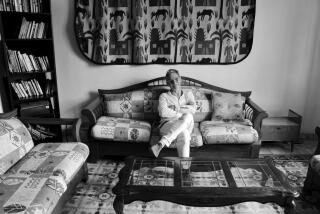Jorge Luis Borges, Alastair Reid tells us...
- Share via
Jorge Luis Borges, Alastair Reid tells us in his graceful introduction to “Seven Nights,” a set of Borges lectures published last fall to far too little notice, “has always thought of English as the language of literature, Spanish the language of real life. . . .” Bilingualism is a common enough phenomenon in our mestizo era. Less common and more fateful is the way that bilingualism coincides in Borges’ life with another, more basic duality: with the difference between seeing and hearing.
For the young Borges, English was the silent, imprisoned sanctity of his father’s library, while Spanish was the voluble, anarchic profanity of Buenos Aires. Now, in his old age (he is 86), Borges is blind. The language of real life is the only language he has left for his art, and the art has changed as a result. The printed word has yielded somewhat to the spoken word, and in that yielding, much else may have given way.
The fiction and poetry for which Borges is famous are alive with irony and allusion, forbiddingly intellectual, arch, terse. They are criticism incognito. “Why don’t you come out and say it?” you find yourself snapping at him. “Say what?” you hear him answer, unperturbed, “What is there to say?” Your irritation makes his point, a point that has made him the darling of contemporary criticism; namely, that it is finally you the reader who writes the book. If you could not, then how could a bookish writer like Borges, reading rather than writing (much less living) his works into being, be the great artist he is?
The mastery of those works--taunting the reader rather than honoring him, confounding rather than consoling him--is immense, and yet how welcome, in the spoken art of “Seven Nights,” to feel the grip loosen. Here, in conversational criticism, Borges conducts himself as many another writer has in his art. That is, he is seductive, he is companionable, he is one of us. Demanding as an artist, Borges becomes inviting as a critic.
These lectures, delivered on seven nights in Buenos Aires in 1977, deal successively with: the “Divine Comedy,” nightmares, the “Thousand and One Nights,” Buddhism, poetry, the Kabbalah and blindness. The lecture on Buddhism is the weakest, a reminder that California is closer to Japan than Argentina is. Borges speaks as if his audience were hearing the word Zen for the first time. By contrast, the opening lecture on the “Divine Comedy,” is one of the best--a balancing reminder that Argentina is closer to Italy than California is. Borges says, “I think that Cervantes, somewhere in ‘Don Quixote,’ says that with two cents of the Tuscan language one can understand Ariosto. Well, those two cents were given to me by the semantic brotherhood of Spanish and Italian.” Many another Argentine has those pennies in his pocket, and the brotherhood is more than semantic.
Borges’ most brilliant lecture is his second, on nightmares, but his most moving, not surprisingly, is that on blindness. “A way of life,” Borges calls it, “a way of life that is not entirely unfortunate.” He offers as a kind of motto for it, or for himself, “those lines of the greatest Spanish poet, Fray Luis de Leon:
Vivir quiero conmigo,
gozar quiero del bien que debo al cielo,
a solas sin testigo,
libre de amor, de celo,
de odio, de esperanza, de recelo.
I want to live with myself,
I want to enjoy the good that I owe to heaven, alone,
without witnesses,
free of love, of jealousy,
of hate, of hope, of fear.”
Borges adds--as who else could?--”Edgar Allan Poe knew this stanza by heart.” (New Directions: $14, hardcover; $5.95, paperback; 128 pp.; translated by Eliot Weinberger.)
More to Read
Sign up for our Book Club newsletter
Get the latest news, events and more from the Los Angeles Times Book Club, and help us get L.A. reading and talking.
You may occasionally receive promotional content from the Los Angeles Times.







